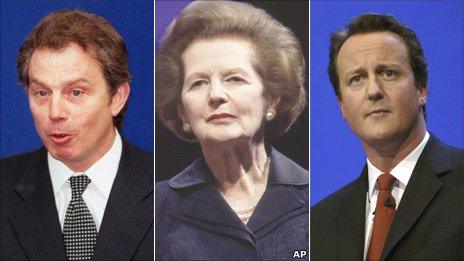Introducing Cameronism
- Published
- comments

I suspect every modern prime minister secretly wants to have their own "ism".
High honour indeed to have your name ism-ised, evidence that your ideas are radical and coherent enough to be classified as a distinct philosophy or school of thought.
People will have their own views about Thatcherism or Blairism (isms tend to divide opinion), but having a full Wikipedia entry - better still a reference in the OED - dedicated to one's political vision is truly to have made one's mark.
The current occupant of No 10 hopes today marks the unveiling of a convincing definition of Cameronism.
His Open Public Services paper is less a policy document and more an attempt to join the dots of domestic reform into a coherent whole.
"The reason for having a paper is that, though it won't be packed with policies, we need to try and change the culture so that people can see there is a consistent line of thought," he told me at a briefing in the cabinet room in No 10 last week.
To his right sat Steve Hilton, the adviser whose fingerprints are all over today's White Paper - a somewhat questionable description for what is really an intellectual proposition.
Upside down accountability
"People will say we are tearing up the welfare state but we have an argument to make," he said.
The argument is that instead of a top-down, Whitehall-led approach to the delivery of public services, there should be a bottom-up, citizen-led model.
Individuals will be given choice and voice as accountability is turned on its head. (I wrote about this theory last year.)
The difficulty is that, while one can see how choice over education or healthcare provision might work, you can't have competing libraries, police stations or prisons in the neighbourhood.
So in trying to find an overarching definition of Cameronism, today's document divides up public services into three groups.
There are "individual services" - things like a school place or a hospital bed. There are "community services" - libraries, museums, community centres etc.
And then there are those state functions which don't fit neatly into the two other categories - drug treatment, prisoner rehabilitation, the Work Programme, the benefits system. These, for reasons of neatness and integrity, are christened "commissioned services".
With three snappy bullet points, all the disparate and apparently random ideas flowing out of Downing Street - localism, big society, data.gov, mutuals, payment-by-results, elected police commissioners, social enterprise - are all suddenly supposed to slot neatly into one big ism.
I think it comes down to this: give citizens a choice of services; if they can't have that, give them a voice to shape services; if they can't have that, use competitive tendering and payment-by-results to drive standards.
Where once ministers would have tried to pull some bureaucratic lever to shape state services, now their job is simply to create the conditions for others to hold providers to account.
Ministers are being careful to talk about diversity of supply rather than a competitive market. They envisage private, public, voluntary, mutual and social enterprise providers all as part of the mix.
Cabinet Office Minister Oliver Letwin, also at the Downing Street briefing last week, said: "We regard diversity of provision as critical but we are blind, indifferent to the provider. We love you all. We hate you all. What we care about is whether you can do the job."
Cameronism, then, casts itself as non-ideological and technocratic.
It focuses on outcomes, on results - unconcerned as to whether the organisation providing a service is public, private or voluntary. And there are numerous people in all those sectors rubbing their hands at the opportunities of the government's reforms.
Private sector profit
You will be hard-pressed to find a voluntary group that wants to dump on the plans: they know many of their clients are desperate for more options and control over the services they access.
Private sector companies like G4S and Serco smell opportunity and profit in the ideas.
David Cameron, like Tony Blair before him, knows the advantage in erecting a big tent and inviting many of his potential critics inside.
In that context, the arguments of public-sector unions are easy to dismiss as so much special pleading - the voice of the old statist left arguing for public monopoly.
But the collapse of Southern Cross today, the care home provider used by many local authorities, is a reminder that operators are always vulnerable in a market.
Diversity might provide cover for inefficiency and waste as well as driving up efficiency and quality, it might be argued.
The question I asked Mr Cameron in the briefing last week concerned a different anxiety.
How would he ensure that, over time, public services are not shaped by the people with the loudest voices and the sharpest elbows?
He talked of the importance of advocacy, of support networks, of community champions. That is indeed the key to making this work, ensuring that when power goes to the people, everyone can access it.
Critics will argue that today's plans remain a disparate collection of political ideas and coalition compromises.
But the current occupant of 10 Downing Street will be hoping that people are convinced there is a consistent and coherent philosophy at work. He hopes we will soon be discussing Cameronism.